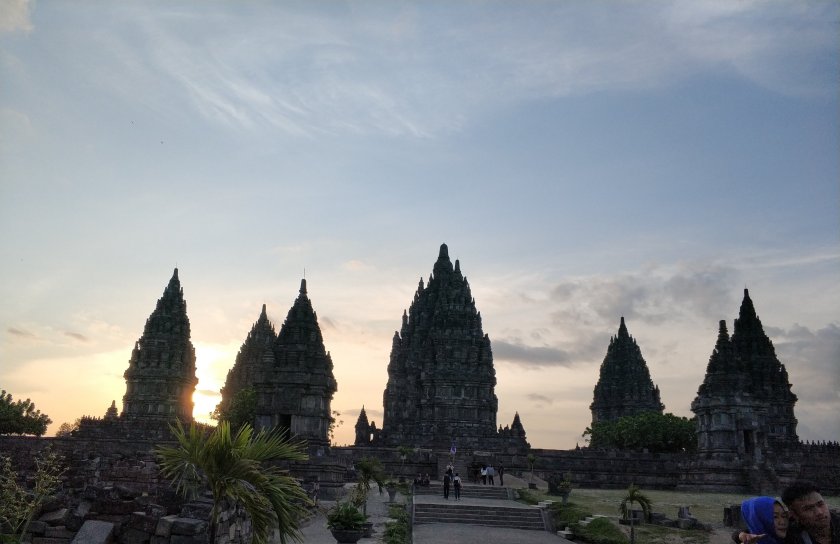
Jakarta is huge, 10 million people, mostly young. It feels as though there are lots of different economies going on – a ten mile taxi ride costs £2 but there are flash shopping malls selling goods at European prices. The public infrastructure is falling apart and there are miles of shacks with burning rubbish dumps next to the railway as we leave but the centre is full of high rise hotels and shopping centres. There are big smart cars and motorbikes, but not much in between. You can tell it’s one of he most unequal countries in the world.


Security in the richer places is highly visible – the malls and hotels have guards. A policeman checks the boot of the taxi and swipes a mirror under the car for explosives as we enter the main station. The main central park has only one entrance with narrow gates and iron bars at shin level to prevent vehicles entering.
The city is a startling mixture of modern and old, rich and impoverished, western and traditional. These clean and tiny streets where we were seeking laundry house a Chinese population right opposite the smartest shopping mall in Jakarta.

Indonesia is the most populous muslim nation on earth with over 250m people, a quarter of them under 14, so it striking how young people are on the streets. Women mostly wear hijabs but otherwise there is no very obvious dress code and they seem to be working, riding mopeds, going out in the evening – generally able to do their thing. Lots of people have a smattering of English and generally people working in hospitality can speak quite a lot.



What was odd, given that Jakarta is the capital city of the sixth largest nation in the world, was how novel we were. When we visited museum square on sunday afternoon, we were mobbed by school students wanting to practice their English; the compere of the AIDS awareness concert greeted us from the stage. I think we saw five other westerners the whole time we were in Jakarta.
We had an unusual journey to visit the beach – you have to pay to go into an amusement park to access it.

And we also had an unexpected gig in the metro cafe next to the hotel on Monday night. Something quite surreal about listening an indonesian band in Jakarta belting out the Sting song An American in New York against a backdrop of John Lennon and Bob Marley.

The train journey eastward to Yogyakarta takes us past more rice fields, over rivers and then round the foothills of volcanic mountains.






We get taxi from Yogyakarta station, but he cheats us so we decide to go back to using grab, the Asian version of Uber, and tip handsomely.
This city is the centre of a special region which still has a king because they were allowed to keep him when he supported the Republic in kicking out the Dutch just after the second world war. Interestingly, a middle aged guy who was telling us about the Japanese occupation didn’t know Britain had been involved in that war though he was knowledgeable about UK football.


People stop us on the street to practice their English, sell us tours and batik and just out of sheer curiosity.
There is a procession on the first morning, led by elephants and featuring a centrepiece that looks a bit like the rush bearing cart.


We catch a bus out to the 9th century Hindu and Buddhist temples at prambanan.


And the following day a taxi to Borobudur, the biggest Buddhist temple in Asia.




Then a cup of Java coffee watching an elephant having a bath.

I screw up ordering the taxi back but five blokes cluster round the car and help me sort it out and the driver takes us to an extra temple on the way home as well as explaining the crops were passing – chillies, peanuts, plantain.

We finish off with a traditional play in the grounds of the museum under the memorial to those fallen in 1949 in the final throes of achieving independence from the Dutch. The event is free and has enthusiastic audience participation, young and old.

Probably English football is the best conversation topic anywhere in the world. I’ve listened to enthusiastic comments about it while sailing in a dhow near Lamu and in elephant country in Zimbabwe. It used to be Manchester United but don’t know if that’s still the case. Still a bit weird you’d know about the football but not Britain being your ally in the war!
LikeLike
We’ve been saying we’re from Manchester because it’s such a good conversation opener – yes, it’s still Manchester United but also people who follow arsenal, Chelsea, man city but even second and third division clubs.
One of the eye-opening aspects of this trip has been the different experiences of the nations we’ve travelled through of the second world war. And the extent to which it really was a world war.
LikeLike